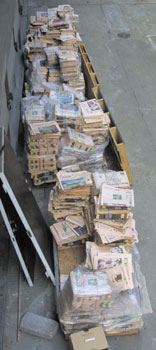My Back Pages
Mark Dery on the paper Information Overload can’t destroy
 Spilling in yellowing drifts across my office floor, my unread New York Timeses are a melancholy monument to time famine. Heaped into a single stack, they would stand a yard tall, a veritable Burgess Shale of media sediment, literalising Foucault’s “archaeology of knowledge.” Is this the first step down the slippery slope that ends in Howard Hughes-ian obsession, my uncut toenails curling into corkscrews, every level surface in my house covered with mouldering newspapers, yet unread?
Spilling in yellowing drifts across my office floor, my unread New York Timeses are a melancholy monument to time famine. Heaped into a single stack, they would stand a yard tall, a veritable Burgess Shale of media sediment, literalising Foucault’s “archaeology of knowledge.” Is this the first step down the slippery slope that ends in Howard Hughes-ian obsession, my uncut toenails curling into corkscrews, every level surface in my house covered with mouldering newspapers, yet unread?
The notion that it’s every bourgeois’ sacred duty to digest the daily Times is a hangover from an earlier, more print-centric era, when a copy clutched firmly under one arm was every American’s moral armour against the dreaded charge of cultural illiteracy. The paper’s notoriously prudish motto (“All The News That’s Fit To Print”) promises a Calvinist diet, long on roughage and short on fun. Flogging oneself with a copy of The New York Times was and is a moral act, part of the American mania for self-improvement that began with The Autobiography of Benjamin Franklin and lives on at Buddhist retreats, where stressed-out dotcommers sit for hours, wracked by leg cramps, while monks whack them upside the head with sticks.
So the Times is our secular Bible, a puritan nation’s Daily Read. Then, too, for disaffected leftists, it’s an EEG of the empire’s ruling class, its selective emphases and conspicuous omissions a graph of the fears and fantasies of the power elite.
Of course, this is the politically correct reason for reading the paper; there are other, less sober ones. Some, like me, still chase the demented dream of holding the world, whole, in our heads. We seem to believe, in some neo-primitive way, that by stuffing our skulls with every scrap of data out there, from the menu of Timothy McVeigh’s last supper to the distinguishing characteristic on the ex-President’s penis, we can rob the information age of its power to overwhelm our puny primate brains.
Beyond such cyber-age power fantasies lies a more cosmic odyssey: the Monty Python-ian quest for the Meaning of Life. In his new nonfiction book, Double Fold, novelist Nicholson Baker rages against the widespread practice, in space-crunched American libraries, of destroying old newspapers. But as the Village Voice reviewer Julian Dibbell has noted, Baker’s quixotic mission to save our old papers conceals a deeper yearning. Baker dreams, says Dibbell, “of having access to all the information ever published, and it drives [him] nuts to see a single scrap of it fall through the cracks.” Bibliophiles like Baker – and myself – want to know everything about everything, perhaps because we dream of a Unified Field Theory of All Human Knowledge, in which every last datum is interconnected with every free-floating bit in a cosmic epiphany. The answer to the metaphysical riddle, “What is the meaning of life?,” some of us are convinced, lies hidden in the mildewed pages of yesterday’s papers – if only we could get to the bottom of them.
Mark Dery’s <markdery AT mindspring.com> latest book is The Pyrotechnic Insanitarium: American Culture on the Brink, published by Grove Press.
Mute Books Orders
For Mute Books distribution contact Anagram Books
contact@anagrambooks.com
For online purchases visit anagrambooks.com







